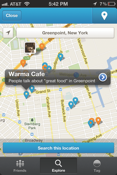If you’re unfamiliar with the Foursquare mobile app, the basic mechanic is this: using your smartphone, you tell Foursquare where you are—this is called “checking in”—and Foursquare makes your location available to other users. As a reward for checking in, you are awarded points—somewhat capriciously, all told: between one and three just for showing up, a couple more if you’re with a friend who also checks in, a few more if the place to which you have checked in is “trending.” You might earn a virtual badge if your check-ins conform to certain patterns. (Been to five different Japanese restaurants? Congrats, the Bento Badge is yours.) Check in to a given venue enough and you might become its “mayor,” which may or may not afford you freebies or discounts.
The problem with checking in is that the novelty wears off pretty quickly, and the rewards feel increasingly arbitrary. So lots of users stop doing it—not out of principle, just simple neglect. Foursquare knows this, and has recently retooled its app away from check-ins and toward what is called, among people who make mobile apps, “discovery.” Looking to leave your house? Open Foursquare, tap on “explore,” and discover a brief list of nearby places a person like yourself might go. “There’s really cool stuff we can do with the data,” says Foursquare founder Dennis Crowley. “And I think reinventing the app gives us a new chance to tell that story.”
Depending on your feelings about serendipity, computers can be pretty good at recommending stuff. Amazon and Netflix, for example, follow your habits of consumption, check them against the habits of others, and make suggestions accordingly. Both of those services keep their counsel curt, however. “Recommended for You,” Amazon murmurs over a litany of titles. “Top 10 for [your name here],” chirps Netflix, indicating a wall of movie posters and offering no further commentary.
The retooled Foursquare eschews this tight-lipped approach in favor of something more unctuous, more verbose. Foursquare would like to talk you through your options in the manner of a hotel concierge. Looking for something to do in Brooklyn at five in the afternoon? “A lot of people talk about this place,” it hints, referring to a bowling alley. “Buy yourself something nice?” it asks coyly, as it points you in the direction of a thrift store. When Crowley talks about telling a story, these are the stories he is talking about: stories about businesses, told by computers.
One story we humans like to tell ourselves about computer intelligence is of its eventual breakdown. A robot laments that it cannot feel love; a robot sputters, “Information overload!” while throwing sparks. Foursquare’s human veneer cracks without much drama, but there is some small hilarity, particularly when it tries to a put a finer point on its recommendations. “People talk about ‘mac n cheese’ in Williamsburg,” it explains, having combed through a history of user tips left in the neighborhood. Reload the page and find out that “bars are popular in Williamsburg,” that “food and drink shops are popular in Williamsburg,” that “people talk about ‘great food’ in Williamsburg.”
Clearly, Foursquare is not half as insightful as it would eventually like to be: it is no Tocqueville for city living, does not reveal to us those behaviors we cannot see for ourselves. Its discovery mechanism is, for the moment, just a slightly dumb, sorta-helpful business-listing-bot.
Despite its hiccups, the effort to couch algorithmic outputs in natural language is important to storytelling, at least as Crowley defines it. “Story” is a concept with a great deal of currency among start-ups—your business, your product, your app: these things should tell a story, it is said, and taking a tone of familiarity makes that story all the more accessible. Foursquare tries, cheerfully, but it’s not much of a storyteller as most of us would understand the term. “A lot of people talk about this place” is the story Foursquare tells about a venue that receives a lot of user comments. “A spot for drinks later on” is the slightly moralizing story it tells about a bar if you’re looking at bars before seven o’clock, you lush. These are shallow aggregations of data slicked up in a narrative-scented grammar, but they barely make it to the threshold of what might pass as a real story.
Still, the check-in data Foursquare gathers does whisper of richer things. A colleague has been regularly checking in at the not-inexpensive restaurant across from work: curious. A friend is suddenly in Colorado: why? The prosaic movements of the city, too, are captured in its databases: a block empties out in the morning, a block fills up in the evening. A café goes out of business, but tips to “get the sweet potato fries” linger. Check-ins push into neighborhoods where check-ins were once rare—the sort of people who check in have arrived.
It’s not clear that Foursquare has any reason or desire to tell these intimate stories, to sketch cities from the blips of their citizens, but to do so seems nearly within its grasp. A computer’s ability to be a canny narrator doesn’t hinge on it talking like one. Rather, if Foursquare can be taught to uncover and express the threads that run uniquely through its data, it will find itself with a new and poignant sort of story, one that doesn’t require a bluff of wordy trappings to move a human reader.





